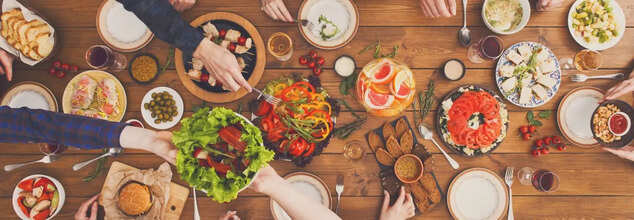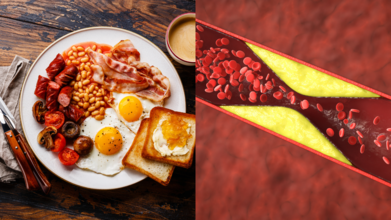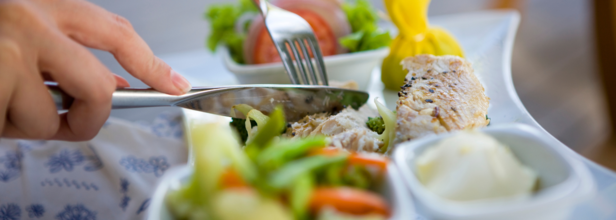- Health Conditions A-Z
- Health & Wellness
- Nutrition
- Fitness
- Health News
- Ayurveda
- Videos
- Medicine A-Z
- Parenting
- Web Stories
Add These 8 Foods To Your Diet For Batter Hair, Skin And Nails

Credit: Canva
Whenever we think about improving the health of our hair, skin, and nails, the first thing we do is head to the beauty aisle. There are countless products promising brighter skin, shinier hair, and stronger nails. However, we rarely consider that our appearance is a direct reflection of what we put into our bodies—and science confirms it.
A 2020 review of 24 articles involving more than 1,700 patients suggested that a Mediterranean diet rich in raw vegetables and fresh herbs, as well as diets high in protein and soy, may serve as a useful complementary therapy for non-scarring alopecia. Meanwhile, a separate research from 2016, indicated that women consuming low-glycemic diets rich in complex carbohydrates, vitamins A, B, and C, and minerals like zinc and magnesium might experience less hair loss during menopause. There are certain nutrients that, if deficient, could negatively impact hair health like biotin, vitamins A and C, and zinc.
What Foods To Eat To Look Beautiful?
Fatty Fish
Seafood rich in omega-3 fatty acids, such as salmon, herring, and mackerel, may benefit the hair and skin. Omega-3s can help reduce inflammation and redness, while also providing protein, vitamin E, and biotin, which support keratin production.
Sweet Potatoes
Rich in the carotenoid beta-carotene, sweet potatoes act as a precursor for vitamin A, which promotes keratin production and supports skin and nail health. Anthocyanins in purple sweet potatoes may have antioxidant properties that improve skin inflammation.
Nuts and Seeds
Sunflower seeds are a good source of biotin, protein, and vitamin E. Nuts such as almonds and walnuts also provide vitamin E, which helps combat oxidative damage and may protect against visible ageing signs.
Avocados
Avocados are rich in healthy fats and essential nutrients, including vitamins C, A, and E. Vitamin C is linked to collagen production and may reduce wrinkles.
Eggs
Protein is essential for hair health, as hair is made of keratin. Diets insufficient in protein may lead to brittle hair. One extra-large egg contains nearly seven grams of protein.
Dark, Leafy Greens
Greens such as spinach, kale, Swiss chard, bok choy, and collard greens provide essential nutrients that support hair, skin, and nail health.
Oysters
Oysters are an excellent source of zinc, a key nutrient for hair growth and tissue repair. One cup of oysters contains 97.5 milligrams of zinc and 14.2 grams of protein.
Water-Rich Foods
Hydration plays a crucial role in skin health. Foods with high water content include cucumbers, watermelon, celery, apples, peaches, tomatoes, lettuce, cantaloupe, watercress, and strawberries.
What Foods Or Additives To Avoid And Why
While eliminating certain foods entirely may not be necessary unless there's an allergy or intolerance, some should be consumed in moderation.
Alcohol
Alcohol dehydrates the body and diverts its energy away from normal maintenance functions, including those supporting skin and nail health. A 2018 study of more than 3,000 women suggested that heavy drinking (more than eight beverages per week) was associated with facial ageing signs, such as under-eye puffiness, midface volume loss, increased blood vessel visibility, and upper facial lines.
Processed Food
Ultra-processed foods, like chips, pizzas, burgers etc may increase the risk of skin issues due to their inflammatory effects. As per a 2021 study of over 15,000 Chinese adults, processed food intake might increase the risk of atopic dermatitis. A 2020 review noted that food processing methods like frying and high-fat diets could contribute to skin ageing.
Ultra-Sweetened Drinks
Sugary diets have been linked to increased skin ageing. Research from 2016 suggests that low-glycemic diets may help prevent hair loss during menopause. Drinks to limit include soda, juice, sweetened iced tea, and coffee with large amounts of sugar.
Coffee Could Reduce The Risk Of This Disease That Affects 830 Million People In The World

(Credit-Canva)
Diabetes may seem like a non-issue, however each year we see an alarming rate of increase in the number of people who have diabetes. According to the World Health Organization, the number of people who had diabetes rose from 200 million in 1990 to 830 million in 2022. An alarming rise as such has prompted many people to call it a silent health epidemic. As more and more people start taking it more seriously, researchers have also found ways we can reduce the risk of it. What if they told you that your morning coffee could be a way too?
For many, coffee is an essential part of the day. In the UK, it has even become the nation's favorite hot drink, with people consuming around 98 million cups daily. While it's a great morning pick-me-up, new research suggests that this popular brew could also offer significant health benefits, especially in lowering the risk of developing type 2 diabetes.
Link Between Coffee and Type 2 Diabetes
Type 2 diabetes affects millions of people, and new findings suggest that a daily coffee habit could help prevent it. Researchers in South Korea analyzed data from 149 different studies to explore how coffee affects the body's metabolic processes that are connected to the development of this condition.
According to their findings, drinking about three to five cups of coffee per day may provide benefits from natural compounds called polyphenols. The researchers specifically looked at five types of these compounds found in coffee and studied their effects on key organs like the small intestines, pancreas, liver, and other tissues.
How Coffee Protects Your Body
The study discovered that drinking black coffee every day can give you several health boosts. These good effects include:
- Keeping your blood sugar steady.
- Calming down swelling in your body.
- Making your body better at using sugar, thanks to improved insulin sensitivity.
- Protecting your cells like a tiny shield, because it acts as an antioxidant.
- Helping your body handle sugar more effectively.
What's really interesting is that both regular coffee and decaf coffee showed similar good results. This tells us that the benefits, like lowering your risk of type 2 diabetes by 20% to 30%, come from special parts of the coffee itself, not just the caffeine. The scientists think these unique coffee ingredients hold a lot of promise for preventing and managing type 2 diabetes.
Expert Opinions and Cautions
Other health experts agree that coffee naturally offers good health benefits and can fit into a healthy way of living. One professor pointed out that coffee beans have about 200 different natural substances. Some of these are good on their own, and sometimes they work together to create even more helpful effects.
However, some experts also give a word of caution. While lowering the risk by 20-30% is a very big deal, this study mainly looked at past research done in labs. This means it might not fully consider everything that happens in real life, like how healthy coffee drinkers are overall or what their other habits are.
The most important message is that coffee's benefits come from drinking it black, without adding sugar or cream. While people who drink coffee regularly can enjoy these possible health advantages, it's still smart to be careful about how much caffeine you have, especially if you have heart problems. If too much caffeine makes you feel jittery, decaf coffee is a great choice because it removes the caffeine but keeps all the good stuff.
Two Breakfast Foods People With High Cholesterol Should Absolutely Avoid

If you are dealing with high cholesterol, there are two breakfast favourites you need to watch out for. In fact, you should consider cutting them out of your diet immediately. Health experts have identified these processed meats as some of the worst offenders when it comes to raising levels of LDL, or “bad”, cholesterol.
According to health experts, sausages and bacon are two of the “worst” offenders when it comes to raising cholesterol, Express.co.uk reported. That is because these processed meats are packed with saturated fat, which is one of the main contributors to high levels of LDL cholesterol, the type that clogs your arteries and increases your risk of heart attacks and strokes.
While cholesterol is not all bad, your body actually needs some of it to function properly. But the trouble starts when the amount of LDL (low-density lipoprotein) cholesterol in your bloodstream gets too high. This type of cholesterol is often dubbed “bad” because it can build up inside your blood vessels, harden over time, and eventually form blockages.
And what is one of the biggest contributors to this blockage? Your diet. Eating foods rich in saturated fat can push those LDL levels higher, which is why some everyday favourites are now on the cholesterol watch list.
Saturated Fat
According to UK guidelines, men should aim for no more than 30 grams of saturated fat per day, while women should cap it at 20 grams. But one pork sausage alone can contain up to 10 grams of saturated fat. Add two rashers of bacon to that plate, and you are likely already tipping over your recommended limit before mid-morning.
Processed meats like bacon, sausages, and salami are particularly high in saturated fats. A single serving of these can provide a quarter (or more) of your daily allowance. That is without counting the butter on your toast or the full-fat milk in your tea.
It is Not Just the Meat
Bacon and sausages may be bad, but they are not the only ones stirring trouble. Writing for the British Heart Foundation (BHF), senior dietitian Tracy Parker says these are the other cholesterol-boosting foods:
- Butter, lard, and ghee
- Coconut and palm oil
- Full-fat dairy products
- Cakes, biscuits, and pastries
- Chocolate
These items are high in saturated fats and sneak their way into our meals more often than we think. A few chocolate biscuits here, some buttered toast there.
A Smarter Start to the Day
What should you eat for breakfast if you are trying to keep your cholesterol in check? Go for fibre-rich foods, lean proteins, and healthy fats. Porridge oats, wholegrain toast, eggs (in moderation), nuts, and plenty of fruits are good choices. Avocado on toast might be trending for a reason.
Of course, it is not just about ditching certain foods. The NHS recommends a holistic approach to lowering cholesterol: eating less fatty food, exercising regularly, quitting smoking, and cutting back on alcohol. All of which can help get those cholesterol numbers back in the safe zone.
Rethink the Fry-Up
That full English might be tradition, but it is also a cholesterol bomb for many people. Sausages and bacon might look and smell delicious on your plate, but their saturated fat content can quietly nudge your heart health in the wrong direction. If you are already dealing with high cholesterol, it might be time to give your breakfast a heart-friendly makeover. It does not mean giving up flavour, just shifting it. Swap the greasy meats for grilled tomatoes, mushrooms, and beans. Try a veggie sausage if you are craving the texture, or go continental with yoghurt and fruit.
What Is The 'Jordan Formula' For Eating Right?

Credits: Canva
It’s a familiar feeling: you sit down with your favorite food—maybe samosas, biryani, or something sweet, and before you know it, you’ve eaten far more than you intended.
Then comes the guilt, the bloating, the uneasy stomach, and a promise to “never do that again.” Sound familiar?
Overeating, especially when indulging in comfort or festive foods, can lead to digestive issues like gas, heaviness, and acidity. While enjoying food is a wonderful part of life, many of us struggle with portion control—especially when it comes to the dishes we love most.
Celebrity nutritionist Rujuta Diwekar, known for her relatable approach to food and fitness, recently shared a simple trick to stop this cycle.
In a video posted on her Instagram, she introduced what she calls the “Jordan Formula”—a mindful way to enjoy your food without overdoing it or feeling guilty later.
What Is the Jordan Formula?
The concept is surprisingly simple, yet effective. Rujuta explains it using an example most Indians are familiar with: sabudana vada.
Here’s how it works:
- Take one sabudana vada and eat it.
- Before reaching for the second one, ask yourself honestly: Can I also eat a third?
- If the answer is no, then don’t eat the second. Stick to just one.
Similarly, if you’ve eaten three vadas, pause and ask: Can I eat a fourth or even a fifth comfortably? If not, stop at three.
This approach trains you to check in with your body before continuing to eat, helping you stop just short of feeling full, when your stomach is still comfortable and your mind still in control.
Why This Works
This small pause creates a moment of mindful eating, something that’s missing in most binge-eating episodes.
According to Rujuta, this method allows you to enjoy every bite without feeling deprived. You’re not saying no to the food, you’re just saying yes to your body’s signals.
In her Instagram caption, she writes:
“If you are guilty of eating mindlessly, the Jordan formula can help. An easy way to enjoy every bite without guilt or gas.”
This formula encourages a more thoughtful relationship with food—one where you're present with each bite rather than rushing through it and paying the price later.
Eating Mindfully in Changing Seasons
Rujuta also reminds us that our appetite changes with the weather. You may notice that you're less hungry during scorching summers or harsh winters, and that’s completely natural. In warmer months especially, our digestive systems tend to be more sensitive, making it important to:
- Increase fiber intake through seasonal fruits and vegetables
- Stay hydrated with water, nimbu pani, or buttermilk
- Choose lighter meals that are easy to digest
This helps support digestion, prevent bloating, and maintain energy levels without overeating.
© 2024 Bennett, Coleman & Company Limited

